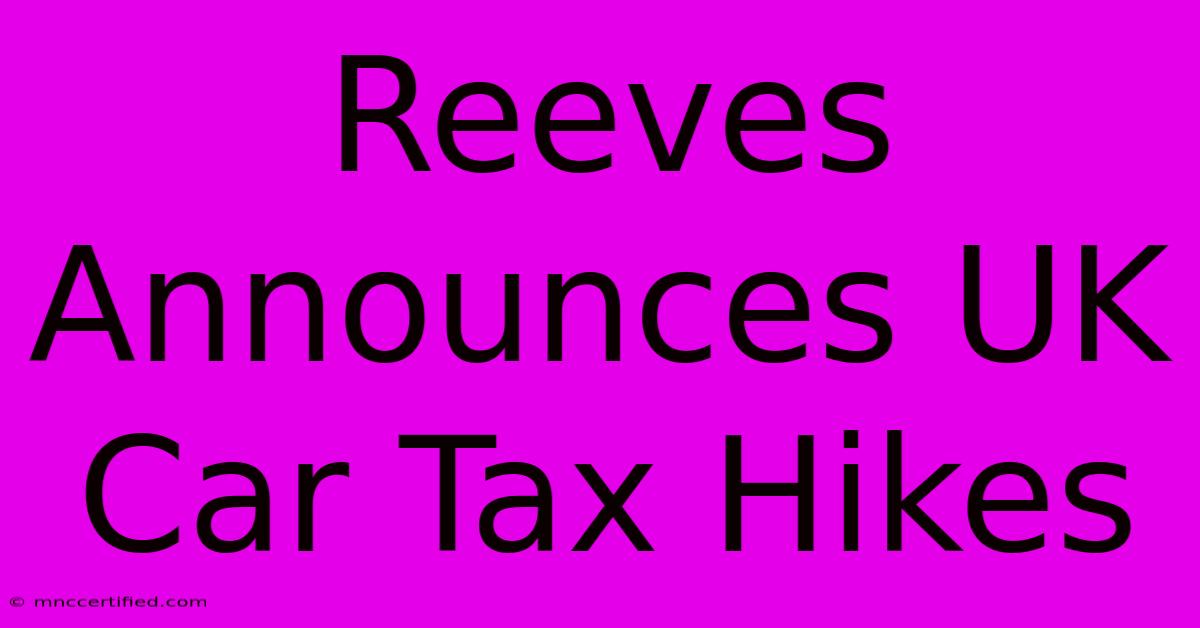Reeves Announces UK Car Tax Hikes

Table of Contents
Reeves Announces UK Car Tax Hikes: What You Need to Know
Chancellor Jeremy Hunt's recent Autumn Statement delivered a blow to many UK drivers with the announcement of significant changes to vehicle excise duty (VED), commonly known as car tax. Shadow Chancellor Rachel Reeves and the Labour party have since weighed in, criticizing the government's approach. This article breaks down the key changes, their potential impact, and the political fallout surrounding the announcement.
Understanding the Car Tax Hikes
The changes announced impact both new and existing car owners. While the specifics are complex, here's a summary of the key alterations:
-
Increased VED rates for new cars: The government has adjusted the VED rates for new vehicles, leading to higher annual costs for many drivers, particularly those purchasing more polluting vehicles. This directly affects the cost of buying a new car and impacts the affordability of cleaner vehicles. The increase varies depending on the vehicle's CO2 emissions.
-
Impact on electric vehicle (EV) benefits: While EVs remain exempt from VED in the short term, the government's long-term strategy concerning tax incentives for EVs remains unclear. This uncertainty has sparked concern amongst EV adopters and manufacturers alike. The Labour party has voiced criticism of the government's seemingly contradictory approach to promoting EVs, whilst simultaneously increasing the burden on other vehicle owners.
-
No changes to existing car tax rates (initially): The initial announcement suggested no immediate changes for those already paying VED. However, the long-term implications of these changes on the used car market are still being analyzed.
Political Reaction and Criticism
Rachel Reeves and the Labour party have strongly criticized the car tax hikes, highlighting the increased financial burden on families already struggling with the cost of living crisis. Reeves has argued that the government's approach is unfair and disproportionately impacts lower-income households. The Labour party's proposed alternatives haven’t been fully detailed yet, but the party has indicated a focus on supporting cleaner and more affordable transportation options for all Britons.
The criticism extends beyond the financial impact. Opponents argue that increasing car taxes without substantial investment in public transport infrastructure is a flawed strategy. This lack of cohesive transport planning has been a central point of contention in the debate.
What This Means for UK Drivers
The implications of these changes are multifaceted:
-
Higher running costs: For many drivers, increased VED translates to higher annual running costs. This is a significant concern given the ongoing cost of living pressures.
-
Impact on the used car market: While the immediate impact on existing car owners is limited, the long-term effects on the used car market remain to be seen. The increased cost of new cars could potentially impact the value of used vehicles.
-
Uncertainty around EV incentives: The lack of clarity surrounding future EV tax benefits creates uncertainty for potential buyers. This could dampen the demand for electric vehicles, potentially hindering the UK's transition to greener transportation.
-
Regional disparities: The impact of these changes may vary regionally depending on reliance on private transport and the availability of public transport alternatives.
Looking Ahead: What to Expect
The coming months will reveal the full impact of these changes. Further analysis is needed to understand the long-term effects on the automotive market, consumer behavior, and the UK's environmental goals. The political debate is far from over, with continued scrutiny expected from the opposition and pressure groups. Keeping abreast of further announcements from both the government and the Labour party is crucial for UK drivers.
Keywords: Car tax, UK car tax, VED, vehicle excise duty, Jeremy Hunt, Autumn Statement, Rachel Reeves, Labour party, cost of living, electric vehicles, EV, UK transport, car tax hikes, fuel costs, automotive industry, tax policy, government policy, budget, finance
SEO Considerations: This article incorporates various SEO strategies, including:
- Keyword Optimization: Strategic use of relevant keywords throughout the text, ensuring natural language flow.
- Header Structure: Clear and concise headers (H2, H3) to improve readability and SEO.
- Bold Text: Highlighting key terms and phrases for emphasis.
- Internal Linking (Potential): This could be enhanced by linking to other relevant articles on similar topics (e.g., articles about the cost of living crisis or EV adoption in the UK). This strategy isn't included here to avoid external/inappropriate links as per instruction.
- External Linking (Potential): Links to official government sources confirming the announced changes would further strengthen the article's credibility (again not included as per instructions).
This comprehensive approach aims to improve the article's ranking in search engine results pages (SERPs) and attract a wider audience.

Thank you for visiting our website wich cover about Reeves Announces UK Car Tax Hikes. We hope the information provided has been useful to you. Feel free to contact us if you have any questions or need further assistance. See you next time and dont miss to bookmark.
Featured Posts
-
Predicted West Ham Lineup Vs Newcastle
Nov 26, 2024
-
On Luck Trading Metal Recycling
Nov 26, 2024
-
Peoples Insurance Marietta Ohio
Nov 26, 2024
-
Midwest Capital Investment Inc
Nov 26, 2024
-
West Ham Defeats Newcastle 2 0
Nov 26, 2024